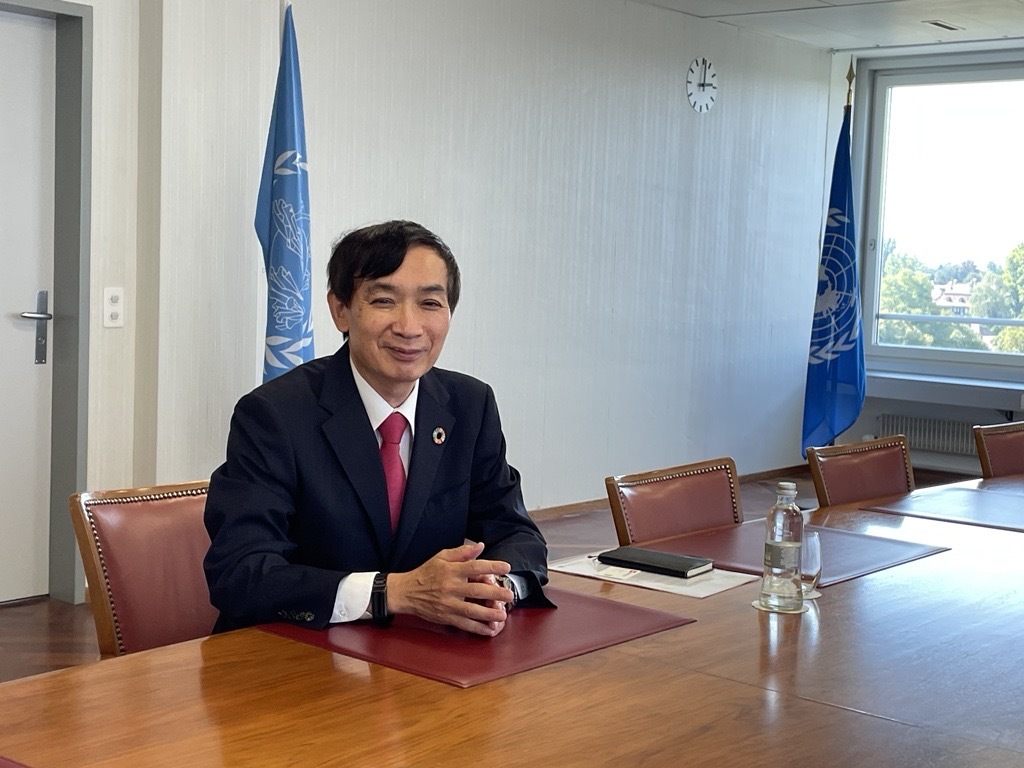How the internet is reshaping global postal services

On October 9, the Universal Postal Union (UPU) will celebrate its 150th anniversary. SWI swissinfo.ch spoke to UPU director general Masahiko Metoki about competition and how public and private postal services must work hand-in-hand.
In Murifeld, a 10-minute tram ride from Bern’s old town, there is a building with a large Pegasus monument in front of it. This is the headquarters of the Universal Postal Union, or UPU, the second-oldest international organisation in the world.
Its existence is surprisingly unknown, yet the UPU has a major impact on how letters are sent, stamped and processed by mail services worldwide. It ensures that a letter or parcel can make its way seamlessly across the borders of different states.
“A defect in the postal network of any country affects the postal network of the whole world. The UPU helps to ensure that the postal network has the same quality across all countries,” explains Masahiko Metoki, who has been at the helm of the UPU since 2022.
A multinational body for simplified mailing services
The General Postal Union, as the UPU was initially known, was set up in 1874 by 22 countries, including Germany, the United States, the United Kingdom, France and Switzerland. By then modern postal services, which began with the stamp system in the UK, had been running for close to a century, boosted by major economic and political changes in Europe. But as more and more letters circulated around the globe, calls grew for order and simplification of mailing procedures between countries.
Germany, then a newly formed nation-state, took the lead to found a multinational organisation but refused to host its headquarters. The country wanted to “show to the rest of Europe that Berlin was not willing to be the new capital”, says Léonard Laborie, an expert on the history of international organisations at France’s National Center for Scientific Research (CNRS).
Europe at the time dominated world commerce. Switzerland, keen to make its mark on the continent, raised its hand to host the headquarters.
Four years after it was founded, the General Postal Union was renamed the Universal Postal Union. In 1948 it became a specialised agency of the United Nations, which gave it international recognition. Today 192 countries and regions are members.
Switzerland kept the leadership of the organisation until 1967. The independence of African countries after the Second World War shifted the balance of power and in 1967, Michel Rahi of the United Arab Republic (now Egypt) became the first non-Swiss to lead the oganisation. Metoki is the first Asian to head the UPU.
Masahiko Metoki joined the Japanese Ministry of Posts and Telecommunications (now the Ministry of Internal Affairs and Communications) in 1983. After working on the privatisation of the country’s postal service, he joined the privatised Japan Post Service Company (now Japan Post) in 2007, where he served as the head of the international business department. From 2012 to 2020, he served as chairman of the UPU’s Postal Operations Council (POC). In 2018, he ran for the UPU director general post as an executive officer of Japan Post, and was elected at the Abidjan Congress in August 2021, beating candidates from Switzerland and Belgium.
Postal services diversify revenue streams
His main challenge is to ensure global postal services can find new financial resources and that the UPU can live to see its next major anniversary. Shipments of letters peaked in 1991 when they reached 8.27 billion worldwide. That figure dropped to 1.56 billion in 2022 — and there are no signs they have bottomed out. Shipments of domestic letters have also declined in member countries, meaning less revenue for domestic mail services as well.
The arrival of the internet and email have reshaped how people communicate, forcing mail services to diversify their revenue streams. The UPU predicts that by 2025, post offices will generate 70% of their income from non-postal services. That compares with 50% in 2005. The UPU provides logistical and technical support to its members, but no funding.
In order to reduce costs, developed countries have been forced to reduce the number of delivery and collection days and raise shipping fees.
In May, Swiss Post announced that it would close about 170 post offices in Switzerland, or one in five. Royal MailExternal link in the UK is considering abolishing Saturday delivery of second-class mail. And France has stopped delivering letters one day to the next. These cuts are often controversial: they are perceived by the local population as a loss of public service, especially in more rural and poorer areas, where residents rely on other services post offices offer, such as banking.
While the internet has upended mail delivery services, it has also led to the rise of e-commerce, with more and more parcels shipped and flown around the globe. The number of shipments of domestic parcels grew from 4.9 billion in 2002 to 26.9 billion in 2022. International parcel deliveries reached 128 million in 2022, compared with 47 million in 2002.
The income linked to parcels and logistics services will make up 36% of post offices’ overall income by 2025, the UPU expects. That compares with 11.3% in 2005.
National mail services are now facing competition from an increasing number of private courier companies, which have entered what was once a monopoly. Companies such as UPS, FedEX, and Amazon Logistics have proliferated. There are around 8,400 courier and delivery services around the world, according to IBIS WorldExternal link.
Competition has led to postal operators in each country coming up with innovate solutions to retain customers. In France, for instance, some post offices have been equipped with fitting rooms so that customers can try on their purchases and return parcels on the spot, without having to take them home.
Metoki says one solution is to diversify services provided by postal services. These include remittances, administrative services such as collecting taxes or proof of identity as well as welfare services. Japan Post, for example, offers a “watch over” service during which postal workers visit elderly people in their homes and report on their condition to other family members.

Reaching out to the private sector
In 2021, the UPU launched what it called its “opening up policyExternal link” . The aim, Metoki says, is to “open up [to the private sector] and share the technology and know-how of the UPU and create new business opportunities for member country governments and postal operators”.
As a first step, in 2022 the UPU allowed private companies to join the Consultative Committee, which advises the Council Administration and the Postal operation council. Previously mostly governments and designated operators were allowed to join. The Council Administration is responsible for the organisation’s operations and the Postal Operations Council creates rules governing operations and technology.
“We will improve the efficiency and profitability of the services currently provided by postal operators by borrowing the wisdom of the private sector,” Metoki says.
Through these collaborations the UPU hopes to raise the quality of its services, such as increasing on-time delivery and its tracking system and reducing the rate of lost items.
To date, more than 40 companies, including Amazon and ACSL, a drone company, have joined the organisation. In the future, Metoki envisions that private companies can provide solutions to problems faced by UPU member countries.
Terminal dues dilemma
Nothing illustrates the business dilemmas postal services face better than the ongoing reform of terminal dues. Terminal dues are delivery charges paid by the sending country to the country of final destination. The sender of a letter or “small packet” (up to 2 kilogrammes) only pays the shipment fee in the country where they deposit it. The country of destination pays for the final leg of the delivery. As a mechanism of compensation, the UPU introduced terminal dues in 1971. In a bid to support poorer countries, they were set lower than those of developed economies.

More
Swiss Post sets out to reinvent the post office
In a rare instance where the UPU made international headlines, in 2018 then-US President Donald Trump threatened to pull out of the organisation if the technical dues system was not reformed. He argued its design favoured China, which positioned itself as a developing country and therefore paid lower dues – this when China was a -major sender of packages worldwide.
As a result of Trump’s threat, the disparity in terminal dues between richer and poorer countries ended in 2020. The immediate result was a significant drop in small packet shipments and an increase in prices for consumers.
According to a report External linkreleased by the UPU in 2023, the tonnage of letters decreased by 36.8% in 2020 because of the reform. “Alterations to the terminal dues regime implemented after July 2020 could have influenced online shoppers’ purchasing decisions by potentially raising international shipping rates,” it concluded.
Jim CampbellExternal link, an American consultant and expert on international postal services, says one reason for the drop is that Chinese e-commerce merchants avoided paying higher terminal dues by circumventing the international postal system. “After the 2020 revision, products from China were transported as freight to warehouses in the United States and other countries, and from there postal operators and private companies began to deliver them,” he says.
China shipped 110.6 billion packages in 2022 alone, more than two-thirds of the world’s total, according to e-commerce consulting firm Pitney BowesExternal link.
Looking ahead, Metoki says he will continue to push for further reform of the system. But simply raising fees to correct disparities will mean they will no longer be able to compete with private companies. “Our members should not only have a public mission, but also learn to become a profitable business,” he says.
Edited by Virginie Mangin/gw

More
Newsletters

In compliance with the JTI standards
More: SWI swissinfo.ch certified by the Journalism Trust Initiative










You can find an overview of ongoing debates with our journalists here . Please join us!
If you want to start a conversation about a topic raised in this article or want to report factual errors, email us at english@swissinfo.ch.